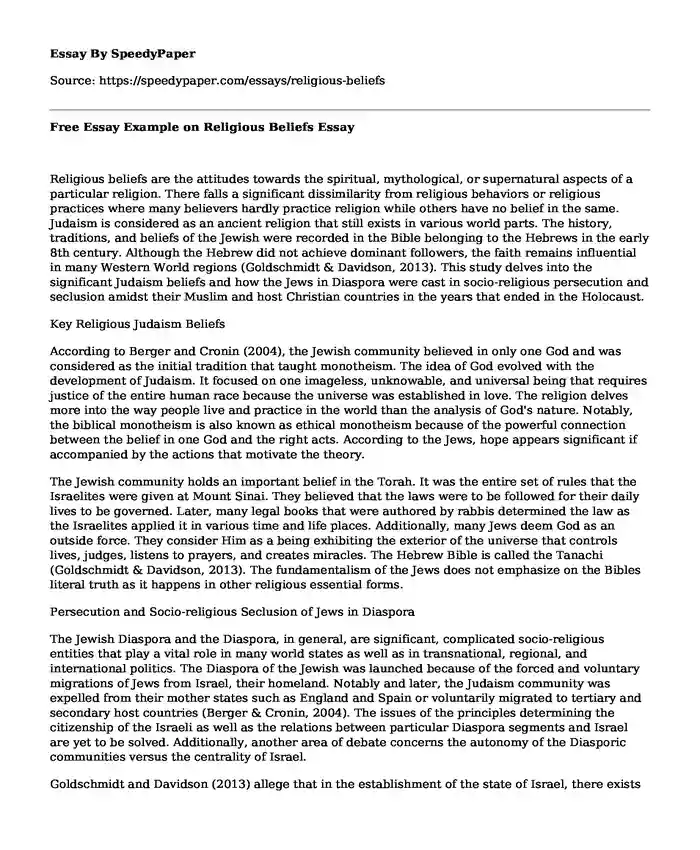Religious beliefs are the attitudes towards the spiritual, mythological, or supernatural aspects of a particular religion. There falls a significant dissimilarity from religious behaviors or religious practices where many believers hardly practice religion while others have no belief in the same. Judaism is considered as an ancient religion that still exists in various world parts. The history, traditions, and beliefs of the Jewish were recorded in the Bible belonging to the Hebrews in the early 8th century. Although the Hebrew did not achieve dominant followers, the faith remains influential in many Western World regions (Goldschmidt & Davidson, 2013). This study delves into the significant Judaism beliefs and how the Jews in Diaspora were cast in socio-religious persecution and seclusion amidst their Muslim and host Christian countries in the years that ended in the Holocaust.
Key Religious Judaism Beliefs
According to Berger and Cronin (2004), the Jewish community believed in only one God and was considered as the initial tradition that taught monotheism. The idea of God evolved with the development of Judaism. It focused on one imageless, unknowable, and universal being that requires justice of the entire human race because the universe was established in love. The religion delves more into the way people live and practice in the world than the analysis of God's nature. Notably, the biblical monotheism is also known as ethical monotheism because of the powerful connection between the belief in one God and the right acts. According to the Jews, hope appears significant if accompanied by the actions that motivate the theory.
The Jewish community holds an important belief in the Torah. It was the entire set of rules that the Israelites were given at Mount Sinai. They believed that the laws were to be followed for their daily lives to be governed. Later, many legal books that were authored by rabbis determined the law as the Israelites applied it in various time and life places. Additionally, many Jews deem God as an outside force. They consider Him as a being exhibiting the exterior of the universe that controls lives, judges, listens to prayers, and creates miracles. The Hebrew Bible is called the Tanachi (Goldschmidt & Davidson, 2013). The fundamentalism of the Jews does not emphasize on the Bibles literal truth as it happens in other religious essential forms.
Persecution and Socio-religious Seclusion of Jews in Diaspora
The Jewish Diaspora and the Diaspora, in general, are significant, complicated socio-religious entities that play a vital role in many world states as well as in transnational, regional, and international politics. The Diaspora of the Jewish was launched because of the forced and voluntary migrations of Jews from Israel, their homeland. Notably and later, the Judaism community was expelled from their mother states such as England and Spain or voluntarily migrated to tertiary and secondary host countries (Berger & Cronin, 2004). The issues of the principles determining the citizenship of the Israeli as well as the relations between particular Diaspora segments and Israel are yet to be solved. Additionally, another area of debate concerns the autonomy of the Diasporic communities versus the centrality of Israel.
Goldschmidt and Davidson (2013) allege that in the establishment of the state of Israel, there exists no consensus between Israeli leaders and the Diaspora regarding the role of the latter. Such an actual act was implemented and promoted by parties and leaders that adopted the ideology that stressed on the dominance of the Palestinian Jewish community during the World War II. When the Jews constituted a Diaspora devoid of a state after the Holocaust, large sections of the Jewish communities developed a supportive strategy towards Judaism. Notably, the plan changed later. In various democracies in the West where the communities live freely, the parties established a communal strategy. The policy encompasses an economic, social, and political behavior. The adoption of the strategy enables the Diaspora members to implicitly declare that they adhere to the social, economic, and political rules in the host countries and to adopt dual loyalties under extreme circumstances.
References
Berger, A. L., & Cronin, G. L. (2004). Jewish American and Holocaust literature: Representation in the postmodern world. Albany: State University of New York Press.
Goldschmidt, J. A., & Davidson, L. (2013). A Concise History of the Middle East (11th ed.). Boulder, CO: Westview Press.
Cite this page
Free Essay Example on Religious Beliefs. (2019, Oct 02). Retrieved from https://speedypaper.net/essays/religious-beliefs
Request Removal
If you are the original author of this essay and no longer wish to have it published on the SpeedyPaper website, please click below to request its removal:
- Free Essay Answering Who Was Nat Turner and Why He Was Significant in History
- Diabetes Thesis Paper Example
- Treatment of Schizophrenia - Essay Example
- LES Whiskey: Marketing Essay Example
- Free Essay Comprising Video Summary and Reaction
- Essay Example about Satyam Computers' Accounting Fraud
- Essay Example. Media and Stereotypes of Underrepresented Groups
Popular categories





